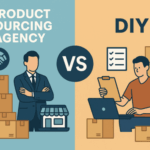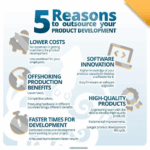In today’s global market, supply chains are complex and fast-moving. Understanding your place is key. Many retailers, startups, and manufacturers get stuck choosing between a wholesaler and a distributor. If you’re sailing without a compass, that choice can hurt profits. This guide clears the fog. You’ll learn the difference between a wholesaler and a distributor in simple terms.
You’ll also find real-world examples, stats, and tips. So whether you’re a small shop owner or a sourcing pro, this blog is your one-stop map.
Wholesaler and Distributor:
What Is a Wholesaler?
A wholesaler buys large volumes of goods. Then sells them in smaller lots to retailers. They are middlemen but not as close to manufacturers as distributors. They often carry many brands and products. Think of them as the stockroom of the retail world. According to IBISWorld, there are over 430,000 wholesale businesses in the U.S. alone.
Wholesalers usually focus on bulk sales. Their goal is high turnover with low margins. They help retailers avoid the hassle of big storage. They rarely deal in customer service or product warranties.
What Is a Distributor?
A distributor works directly with manufacturers. They often have exclusive rights to sell certain products. They are not just middlemen. They offer training, technical help, and even marketing. Distributors are like brand ambassadors.
They usually cover specific regions or industries. Their role is deeper and more structured than wholesalers. They hold strong relationships with the source—the manufacturers. Distributors account for nearly 70% of all B2B transactions in the industrial sector (NAW, 2023).
Wholesaler vs Distributor: Not Just Two Peas in a Pod
Where the Goods Come From
Distributors get products straight from the horse’s mouth—the manufacturer. Wholesalers buy from distributors or sometimes manufacturers.
If you need the freshest stock or the latest models, go to a distributor. Wholesalers may have broader choices but older stock.
Relationships and Exclusivity
Distributors often have signed contracts. Sometimes, they are the only ones allowed to sell certain products. Wholesalers? Not so much. They deal with various suppliers. They usually don’t sign exclusivity deals.
Services on the Side
Distributors don’t just sell. They guide you like a sherpa. They may offer installation, training, or technical support. Wholesalers usually keep things simple. They store, pack, and ship.
Size of Orders and Inventory
Wholesalers deal in bulk. They keep massive stock and sell in larger quantities. Distributors work more precisely. They focus on supply flow rather than volume.
Pricing and Margins
You might think the wholesaler always offers the lowest price. That’s not always true. Distributors may provide added value, making higher prices worthwhile. 56% of buyers say they are willing to pay more for better product support (Forrester, 2022).
Target Market
Distributors serve wholesalers or large retailers. Wholesalers serve smaller retailers or businesses. A distributor is upstream. A wholesaler is midstream.
Pros and Cons: Every Rose Has Its Thorns
Wholesaler Pros
- Lower prices due to bulk deals
- Multiple product types in one place
- No long-term contracts
Wholesaler Cons
- Limited product support
- May not carry the latest models
- Less control over the supply chain
Distributor Pros
- Direct manufacturer support
- Better technical knowledge
- Reliable inventory flow
Distributor Cons
- Higher prices due to services
- Less flexibility in product range
- Often bound by contracts.
Wholesaler vs Distributor: When to Fish or Cut Bait
Choose a Wholesaler If:
- You’re a small business needing lower prices
- You want quick restocks
- You prefer variety over exclusivity.
Choose a Distributor If:
- You want direct product knowledge
- You need training or technical help.
- You’re planning a long-term relationship with one brand.
Case studies
A local electronics shop needed after-sale support. They chose a distributor. Their competitor, a discount store, focused on bulk low-cost items. They chose a wholesaler. Both choices worked, based on their needs.
Wholesaler and Distributor in a Digital World: A New Ball Game
Rise of Online Wholesalers
E-commerce has flipped the script. Sites like Alibaba and Faire offer global wholesale access. You can now source like a big fish without a massive budget. Online B2B marketplaces are projected to grow by 20% annually through 2030 (McKinsey, 2023).
Digital Distributors Take the Stage
Some platforms now combine distributor roles with tech. They help with marketing, analytics, and forecasting. They’re not your old-school middlemen anymore.
Transparency and Data Drive Sales
Buyers today want clarity. They check delivery times, customer reviews, and pricing online. 74% of B2B buyers research online before contacting a sales rep (Gartner, 2023).
Tips and Tricks: How to Deal with Distributors and Wholesalers Without Breaking a Sweat
Working with a Wholesaler
- Compare at least three suppliers before buying
- Ask about MOQs (Minimum Order Quantities)
- Review payment terms and delivery timelines.
Working with a Distributor
- Read the contract—every word.
- Request support documentation and training
- Foster good communication to build trust.
Conclusion:
The wholesaler vs distributor debate isn’t about right or wrong. It’s about fit. When you understand how they differ, you can pick your path wisely. Think long-term. Choose partners that grow with you. Whether you go big with a distributor or stay nimble with a wholesaler, know the ropes.
Because in the business jungle, it’s not the strongest that survive. It’s the smartest.
Whether you pick a wholesaler or distributor, your choice affects your profit and growth. The key is knowing what your business truly needs. Consider inventory, support, pricing, and future goals.
And now, you know the difference between a wholesaler and a distributor like the back of your hand. Need help with sourcing? Check out BrandNewMD — the best sourcing company out there. They can help you connect with the right wholesaler and distributor for your business.
FAQs:
Can a wholesaler also be a distributor?
Yes, some companies wear both hats. But they are rare birds.
Which is better for a startup?
Usually a wholesaler. They offer flexible terms and lower entry costs.
Do distributors only work with big brands?
Not always. Niche brands often use distributors to expand their reach.










